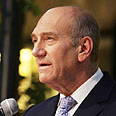

Olmert. Not born to be prime minister
Photo: Gil Yohanan
WASHINGTON – Prime Minister Ehud Olmert
has promised
to resign should he be charged with receiving a bribe from an American businessman, but from an interview published Friday in the United States it appears that he does not believe this is the right time to do so.
"I have to think about it. I have to think about the possible ramifications of an early retirement," Olmert said in an interview with the Washington Post
and Newsweek
held before the gag order placed on details pertaining to the new police investigation against him was partially lifted.
"I don't really see that this will bring any better outcome for the country at this point. Not that a person is indispensable or irreplaceable. . . . But given the circumstances right now, I think it will not do good that I step down at this point.
PM Probe
Aviram Zino
Jerusalem District Court grant's attorney general's request to take deposition from American businessman in investigation against prime minister. State prosecutor tells court Talansky expressed concern PM might send someone to hurt him
"I was not born to be prime minister, and I'm not going to stay here until the end of my life. I'm too young for that. Right now, I think it will be a mistake (to leave), and I have a job to accomplish, a vision to realize. This is the great vision of peace which I think is possible this time more than ever," he told his interviewers.
The prime minister said in the interview that the gaps with the Palestinians could be bridged and that the borders problem could be resolved, leaving the Jerusalem issue to be discussed at a later stage.
Olmert noted that "a more detailed and accurate outline of how a solution of the two states should look" could be achieved. "Some of the issues will be discussed later by agreement. The future of Jerusalem is one of them. It is probably going to be the last issue."
'Talks with Syria ought to be discussed quietly'
The prime minister added, "The borders, once agreed, will be closer to what they were in '67 than what they are today because we will give up a large part of the territories . . . in the context of full, comprehensive peace and the total end of any hostilities."
Addressing the refugee problem, he said, I don't think they have to give (the right of return) up. They don't have a right of return, and I don't think that this is on the agenda as far as Israel is concerned."
Referring to reports on peace talks with Syria, Olmert noted that "the relations between us and Syria have to be reexamined, (as well as) the possibility of making peace. It's not something that can be done publicly. I don't mind that (Syrian) President Assad made an announcement that there will be negotiations, but the actual negotiations ought to be discussed quietly. In principle, we are ready for it if they are."
He added that the US does not object such talks. "I think that if the Syrians will handle the negotiations with us in an appropriate manner, they will be surprised to see how these negotiations can improve their status with America.
"My personal view is that no one can be of better help to this process than (US) President Bush. Because any new president in America, if confronted with this issue, will have to wait two years at least until he learns enough and finds the appropriate time to devote to this, while Bush knows, Bush is familiar, and Bush understands.
"Therefore, if one is interested in a (Syrian-Israeli) process that ultimately leads to a public endorsement by the United States of America, then he has to hurry up. I believe, for reasons that I don't want to go into, that for Syria, the road to Washington must cross Jerusalem," Olmert said.















